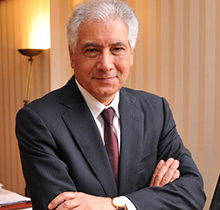INTERVIEW
Interview with Dr. Ahmed GALAL
(President and Coordinator of FEMISE, Managing Director of the Economic Research Forum – ERF) within the context of the forthcoming FEMISE Annual Conference 2016 (13 and 14 February, Hotel Grande Bretagne, Athens, Greece) on « Two decades after Barcelona: Rethinking the EU-Med partnership. »
There has been some disappointment over Europe’s response to the Arab Spring among Mediterranean Partner Countries. In your opinion, how could the EU provide the needed support and what could its long-term policy be?
The collective political, cultural and economic power of the EU countries, along with their historical ties and geographic proximity, mean that they clearly can play an important role. The EU will be more secure and economically better off when its neighbours are peaceful and comparatively well-governed and prosperous.
Any rethink of the EU’s role should begin with a better understanding of what has actually transpired in the region since December 2010. Before the uprisings, the rulers in the region had struck an authoritarian bargain with their citizens, according to which economic handouts were delivered in return for political acquiescence. Following the process of economic liberalisation that began in the early 1990s, economic growth picked up but most of the benefits went to “loyalists” of the regimes. The authoritarian bargain eventually broke down when people around the region took to the streets demanding “bread, freedom and social justice”. In response, the best long-term policy towards the region that the EU and other external actors should adopt, therefore, is one aligned with these popular aspirations, and not with the interests of autocratic rulers seeking short-term gains. A powerful neighbour like the EU can and should play a catalytic role in this transition process and in the resolution of conflicts, for its own self-interest if for nothing else.
Through the Barcelona Process and the European Neighbourhood Policy important efforts were made by the EU to contribute to shared security, stability and prosperity. But it is now clear that, despite some economic progress, the situation in the region is much more complicated than it was in 1995. What went wrong in the process?
Efforts were indeed made. Yet, the EU’s Association Agreements and neighbourhood policy are not the same as accession to the European Union. It is clear that the prospects of joining the EU, provide strong motivation for undertaking reforms (such as the case of Turkey). By excluding accession, justified as that may be, the countries around the Mediterranean’s southern rim cannot benefit from full access to EU markets, from greater mobility of production factors, or the harmonisation of regulations and policies.
Leaving aside the accession issue, the Association Agreements took the form of shallow rather than deep Free Trade Agreements (FTAs) that involved no commitment to introduce reforms in areas like competition policy, public procurement and the protection of intellectual property rights. This translated into modest benefits in terms of trade creation compared to trade diversion. The EU’s agreements were limited to manufactured goods, where the southern neighbours had limited comparative advantages.
Overall, the EU’s differentiated treatment with its bilateral negotiations meant that the Southern countries’ autocratic rulers could rush into signing these agreements to bolster their own legitimacy and benefit their supporters, rather than to secure shared and lasting economic gains.
The European Commission reacted to the Arab Spring by revealing its “Review of the European Neighbourhood Policy” in late 2015 with hopes that the new Policy will respond to the Southern countries’ aspirations. What new instruments can be included to make a real difference post-Arab Spring?
The southern countries involved should be offered a common set of rules for integration with the EU that would leave them the choice of whether or not to take part. Fresh negotiations can still be handled bi-laterally, building on existing agreements, but greater South-South integration should be encouraged. Also, regional infrastructure projects could be part of the new policy.
The guiding principle in all of this should be “convergence” rather than accession, association or the neighbourhood. And needless to say, a clear distinction should be drawn between countries that are in transition and those in conflict.
Straightforward as these recommendations are, do you feel there is a risk that they be resisted by some interest groups ?
Indeed, they are likely to be resisted, especially within the EU, by interest groups like farmers, by some EU member states that may be adversely affected, by those bureaucrats who prefer modest change rather than major shifts or policy battles, and by popular opinion among electorates sensitive to migration. It also seems reasonable to say that the destiny of the Arab Spring countries will be determined at home through dynamic processes involving interest groups and institutions.
The forthcoming FEMISE conference will be an opportunity to share more views from international and South Med experts on EuroMed relations and most importantly their assessment in terms of how a mutually beneficial EU-Med Partnership can be achieved.
Propos recueillis par le staff FEMISE




